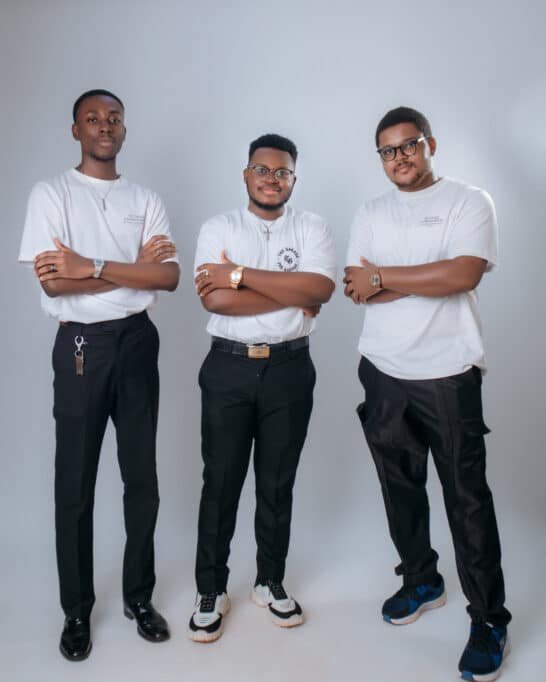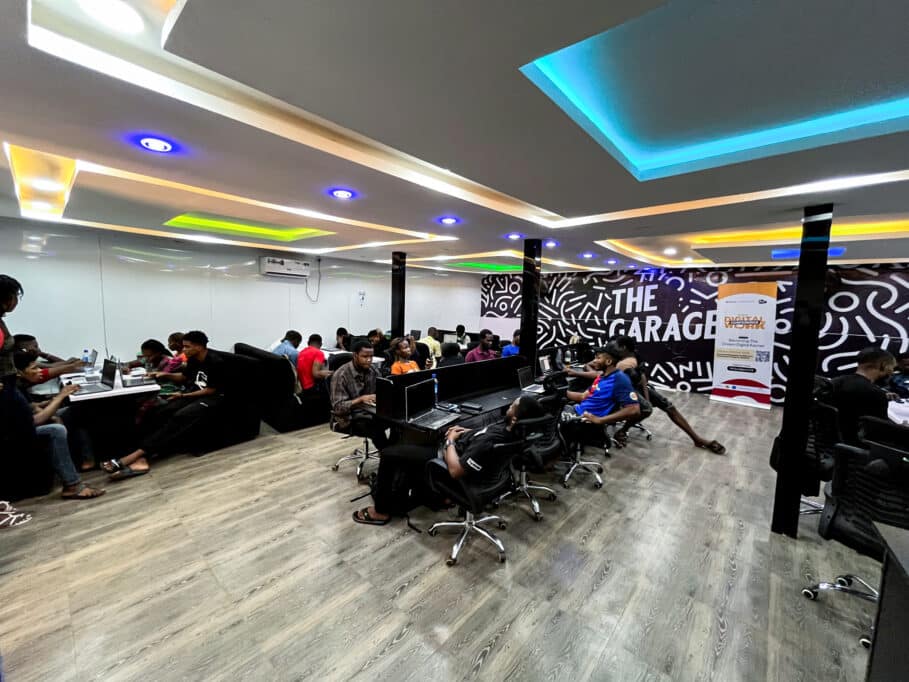In 2020, while still in his second year at the University of Nigeria Nsukka (UNN), Raymond Chuma-Onwuoku, CEO and Co-founder of The Garage, a co-working startup for students, embarked on his first job as a writer for a Web3 company. This marked the start of his journey in juggling multiple roles and rapidly advancing his career.
Despite his progress and personal achievements, he often felt disadvantaged simply because he was on campus.
He believed being in university put him several steps behind similarly skilled peers elsewhere. He struggled to access even basic work opportunities and couldn’t shake the feeling that service providers were neglecting university campuses due to a perceived lack of economic activity.
Though this frustration persisted until 2023, he had built a career that enabled him to afford personal infrastructure like reliable power and Internet connectivity. He had also invested in certifications needed for further advancement.
He could finally provide himself with the opportunities that had previously been out of reach. It also helped that he had supportive friends at his university who helped him navigate these challenges.
During a vacation in Lagos that same year, he stayed at a hotel in Victoria Island with a friend, who worked for Argent—a blockchain wallet company. They frequently visited Café One, a nearby co-working space.
Even though it was supposed to be a vacation, he continued working and realised he could accomplish much more despite the non-work-related activities filling his time.
This experience led him to question how much productivity was lost due to challenges like unstable power supply and poor Internet connection and what could be done to address them, ultimately giving birth to The Garage.
“Originally, the plan was to build a co-working space and address these issues. But building a facility from scratch and the six months of construction helped us evolve as individuals and through our interactions with the communities around us,” Chuma-Onwuoku discloses.
His goal was to develop a full-stack solution that provides quality workspaces and harnesses the economic potential of university campuses to enhance productivity, support learning, and offer more opportunities to students.
Struggling with overplanning and ideas fizzling out, he began taking swift action and firm commitments, which led to the clear development and pursuit of a co-working space vision in May 2023.
In the same month, he started building The Garage, with the co-founders, Darlington Nnam and Peter Ajanwachuku, joining in June. Their official launch was on November 10, 2023, and they secured their first paying customer three days later.
The Garage effect: Meeting co-founders at school

Chuma-Onwuoku and his co-founders met over two years ago. He met Nnam at UNN, where they grew from acquaintances to close friends.
He also connected with Ajanwachukwu through the University of Nigeria Debate Society, where Chuma-Onwuoku was the secretary and Ajanwachukwu was an aspiring member. Their shared values and talents led them to collaborate on various projects.
They founded Scala, an agency to streamline their freelance efforts. The agency had no online presence but it won a bid to develop Anambra State’s investment portal and now supports a select group of clients.
Nnam is the Head of Engineering at The Garage, leveraging his five years of experience as a blockchain engineer to enhance productivity and education through innovative products.
Ajanwachukwu, a designer at PiggyVest, a Nigerian fintech company, applies his expertise to shape The Garage’s design strategy, drawing from his work on several projects.
Chuma-Onwuoku, with extensive marketing experience, currently serves as Content Marketing Lead at Iorad, a Boston-based edtech startup, and has led a full-stack agency with clients including universities and government entities.
He manages marketing, business, and space operations at The Garage and also serves as a product manager.
Their collective expertise in campus dynamics and student needs allows them to deliver tailored educational experiences.
As Chuma-Onwuoku observes, “While many co-working space companies offer value-packed content, they often lack the nuance necessary to truly address the specific realities of their target audience [students].”
This insight into campus dynamics and community building differentiates The Garage from others in the space.
The Garage does more than boost productivity

The Nigerian student experience has evolved, with traditional degree pathways now offering fewer career opportunities. Graduates from several fields, including medicine and engineering, are increasingly exploring alternative paths, such as tech, eCommerce, and content creation.
A sneak peek into an upcoming survey by The Garage reveals that over 65% of students engage in activities beyond their degree programmes. However, organisations hardly have the risk appetite to support these new ventures.
Chuma-Onwuoku says that The Garage seeks to address these challenges by investing in campus infrastructure and education.
Fun fact: The name, The Garage, is inspired by tech giants like Amazon and Facebook, both of which began in a garage and dorm, respectively. Consequently, the co-working space aims to nurture small ideas and transform them into major ventures by supporting young people in remote areas to unlock their potential and drive innovation.
The company offers two main services: co-working spaces designed to increase productivity and learning, and an edtech solution that provides students with customised learning programmes and resources.
One key feature in its product lineup is a booking system that uses social competition to drive productivity. Inspired by platforms like Duolingo, this system includes leaderboards to track how often students use the co-working space and their productivity levels.
“We show you how much work you’re doing, compared to other people within our customer base or your chosen group. So basically, we have leaderboards on work hours and work done, and we offer incentives, including extra co-working space credits, merchandise, and exclusive memberships, to people who top these leaderboards.”
To foster education, The Garage offers flexible learning solutions that accommodate students’ schedules, including slow-paced learning modules and weekly three-hour lectures.
It is developing several educational programmes, starting with crucial non-technical skills like content writing, marketing, and customer success.
Chuma-Onwuoku explains that the company is starting with these skills because there is a significant gap in educational programmes in these areas that should be addressed first.
It plans to expand its offerings to include technical skills such as software engineering, data analysis, and product management. This gradual evolution will allow it to build a comprehensive educational platform that meets many students’ needs.
The Garage combines physical and virtual communities to enhance learning and exposure to opportunities. Its 24/7 facility allows students to spend extensive hours building connections and learning from one another.
On the virtual side, it’s developing a tech product that offers tailored learning experiences.
“Rather than overwhelming students with extensive time commitments, we provide learning programmes that fit within their existing schedules, focusing on balanced, intensive sessions during holidays and shorter, manageable weekly sessions.”
The Garage also creates job opportunities through partnerships with companies, providing flexible work arrangements that fit academic schedules. It supports career development with job boards and options such as exam leave. This recently launched product aims to connect students with part-time jobs related to their studies, and the company plans ongoing improvements to meet students’ needs.
Rapid growth and profitability in a challenging economy
The company faced significant hurdles early on, with unreliable power supply one of the major challenges. Power problems forced the company to shift its focus to stable solutions and adopt a cautious expansion strategy.
Chuma-Onwuoku clarifies that they switched to solar power, but the high demand from users with multiple devices overloaded the solar setup.
The team then opted for a larger backup generator. However, the company is redesigning its solar setup to meet these demands and is progressively investing in the new design.
The Garage views other co-working spaces as indirect competitors due to its unique focus on campuses, a niche often avoided by general co-working spaces due to risks like unstable conditions, including industrial strike actions, and shifting student needs.
Currently bootstrapped, it reinvests profits from its self-built facilities into further development. The Garage, which built its co-working space within six months, prefers building over renting, though it is open to acquiring existing spaces if suitable.
With a team of ten, it plans to continue bootstrapping and funding growth through operational profits.
The business model includes generating revenue through co-working spaces, where it earned between $10,000 and $15,000 in the first nine months, with plans to invest in its technology and learning programmes.
The company has been profitable since March 2024, generating approximately ₦3 million ($1,886.85) monthly from its co-working space, with a 5% month-on-month growth rate. It expects revenue to increase to around ₦5 million ($3,144.75) and userbase to surpass 3,000 by December 2024.
On what drove its profitability, he says, “We held the Digital Work Conference in February 2024, which significantly contributed to our path towards profitability. We brought speakers from technology, the creator economy, and governance to Nsukka, addressing over 1,000 students about careers in the digital economy.
“Alongside our partners, we awarded over ₦30 million in tech scholarships, academic tuition payments, laptops, and cash giveaways. This event helped build our reputation and drove our success in the subsequent months.”
Between November 2023 and July 2024, the company recorded over 16,370 visits and 2,100 active monthly users, who log over 90,000 working hours monthly. The growth rate stands at 7-8% per month.
Additionally, it earns about ₦100,000 ($62.90) to ₦150,000 ($94.34) monthly from campus startups and small businesses through advertisements, with growth expected as it develops its advertising product.
The Garage is developing an advertising model to leverage its high foot traffic, offering advertising opportunities and discount codes to companies targeting campus markets.
Supported by the Anambra State Government and local universities, The Garage is refining its model for smooth expansion. By Q4 2024, it plans to enter two additional Southeast states, with final arrangements in progress.
The company aims to expand to about ten universities by the end of 2026, focusing on the Southeast region, which Chuma-Onwuoku says has significant growth potential and existing infrastructure gaps. In the long term, it plans to be in 20-30 locations across the six geopolitical zones in Nigeria, supporting about 50,000 students.











